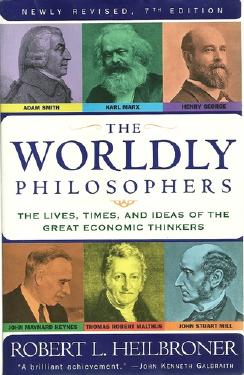The Worldly Philosophers: The Great Economic Thinkers by Robert L Heilbroner

Author:Robert L Heilbroner
Language: eng
Format: mobi, pdf
ISBN: 9780713901221
Publisher: Allen Lane
Published: 1969-01-02T05:00:00+00:00
Another, rather different nod of approval came from those who agreed with Sir Charles Crossthwaite that the real question between Britain and Siam was “who was to get the trade with them, and how we could make the most of them, so as to find fresh markets for our goods and also employment for those superfluous articles of the present day, our boys.”
And then, too, the process of empire building brought with it prosperity for the empire builders. No small part of the gain in working-class amenities which had so pleased the Committee on Depression was the result of sweated labor overseas: the colonies were now the proletariat’s proletariat. No wonder imperialism was a popular policy.
Throughout all of this, the officialdom of economics stood to one side, watching the process of imperial growth with equanimity, and confining its remarks to the effect that new possessions might have on the course of trade. Again it was the critics of the underworld that focused attention on this new phenomenon of history. For, as they looked at the worldwide race for domination, they saw something very different from the mere exciting clash of politics or the inexplicable whims of personalities in power.
They saw a whole new direction to the drift of capitalism; in fact, they saw imperialism as signaling a change in the fundamental character of capitalism itself. Still more significant, they divined in the new restless process of expansion the most dangerous tendency that capitalism had yet revealed—a tendency that led to war.
It was a mild-mannered heretic who first made this charge, the product, as he described himself, of “the middle stratum of the middle class of a middle-sized town of the Midlands.” John A. Hobson was a frail little man, much worried over his health and plagued by an impediment in his speech which made him nervous about lecturing. Born in 1858, he prepared for an academic career at Oxford; and by all we know of his background and personality (which is not much, for this shy and retiring man managed successfully to avoid Who’s Who), he was destined for the cloistered anonymity of English public-school life.
Two factors intervened. He read the works of Ruskin, the British critic and essayist who mocked at the bourgeois Victorian canons of monetary value and who trumpeted, “Wealth is life!” From Ruskin, Hobson acquired an idea of economics as a humanist rather than an impersonal science; and he turned from the refinement of orthodox doctrine to preaching the virtues of a world where cooperative labor guilds would give a higher value to human personality than the crass world of wages and profits. His scheme, Hobson insisted, was “as certain as a proposition in Euclid.”
As a Utopian he might have been respectable; the English like eccentrics. It was as a heretic, a trampler on the virtues of tradition, that he became an economic pariah. Chance threw him into the company of a person called A. F. Mummery, an independent thinker, a successful businessman, and an intrepid mountain climber (he was to meet his death in 1895 on the heights of Nanga Parbat).
Download
The Worldly Philosophers: The Great Economic Thinkers by Robert L Heilbroner.pdf
This site does not store any files on its server. We only index and link to content provided by other sites. Please contact the content providers to delete copyright contents if any and email us, we'll remove relevant links or contents immediately.
International Integration of the Brazilian Economy by Elias C. Grivoyannis(111059)
The Radium Girls by Kate Moore(12028)
Turbulence by E. J. Noyes(8049)
Nudge - Improving Decisions about Health, Wealth, and Happiness by Thaler Sunstein(7706)
The Black Swan by Nassim Nicholas Taleb(7129)
Rich Dad Poor Dad by Robert T. Kiyosaki(6632)
Pioneering Portfolio Management by David F. Swensen(6300)
Man-made Catastrophes and Risk Information Concealment by Dmitry Chernov & Didier Sornette(6019)
Zero to One by Peter Thiel(5802)
Secrecy World by Jake Bernstein(4753)
Millionaire: The Philanderer, Gambler, and Duelist Who Invented Modern Finance by Janet Gleeson(4478)
The Age of Surveillance Capitalism by Shoshana Zuboff(4292)
Skin in the Game by Nassim Nicholas Taleb(4248)
The Money Culture by Michael Lewis(4207)
Bullshit Jobs by David Graeber(4190)
Skin in the Game: Hidden Asymmetries in Daily Life by Nassim Nicholas Taleb(4006)
The Dhandho Investor by Mohnish Pabrai(3765)
The Wisdom of Finance by Mihir Desai(3747)
Blockchain Basics by Daniel Drescher(3583)
